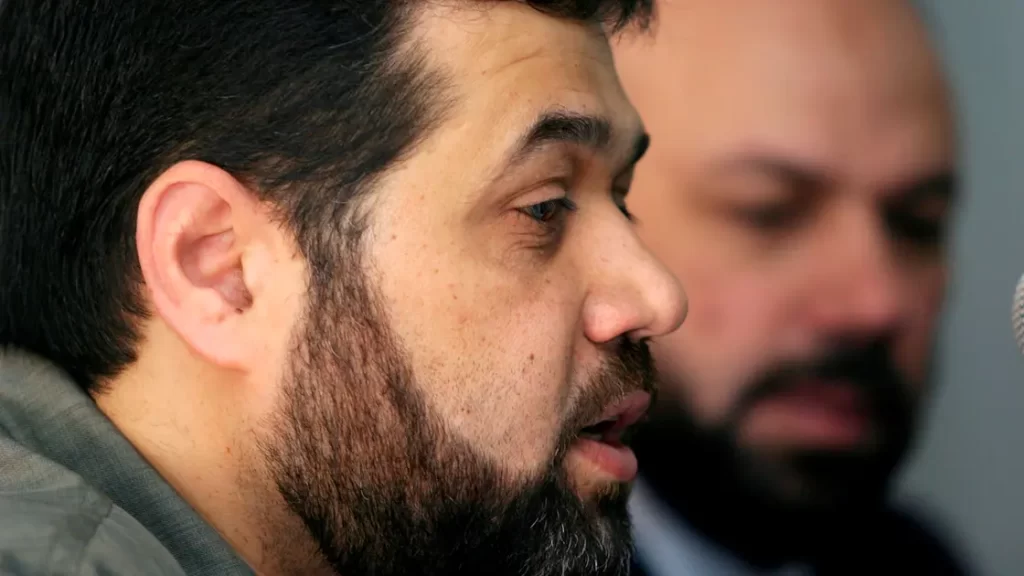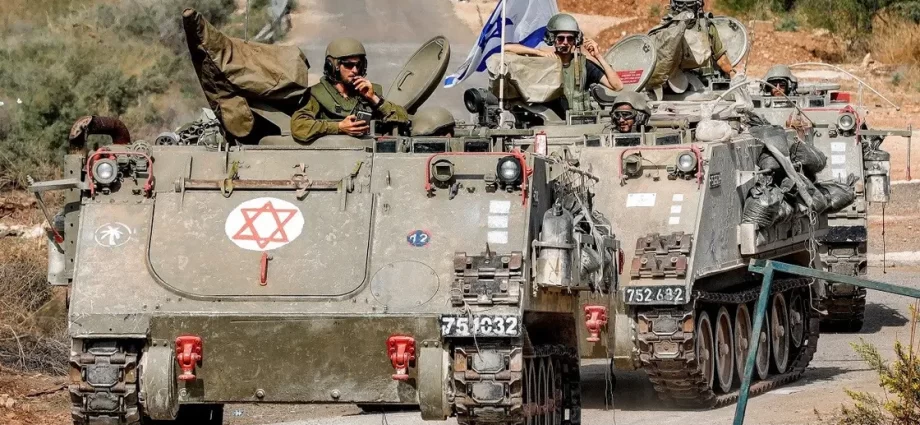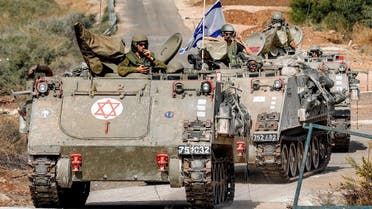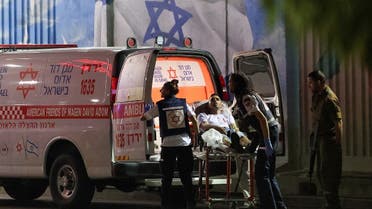Israeli military surrounds Gaza City as conflict escalates
Israel’s military said Thursday its forces have surrounded the Hamas stronghold of Gaza City after a day that saw the Palestinian territory pounded by deadly fire.
The Ezzedine Al-Qassam Brigades, the military wing of Hamas, warned Israel its invading soldiers would go home “in black bags.”
Spokesman Abu Obeida said: “Gaza will be the curse of history for Israel.”
The Hamas warning came after Israeli military spokesman Daniel Hagari said troops had completely surrounded Gaza City after days of expanding ground operations.
“Israeli soldiers have completed the encirclement of the city of Gaza, the centre of the Hamas terror organisation,” Hagari told journalists.
“The concept of a ceasefire is not currently on the table at all,” he added.
Amid growing fears of the conflict spreading, Israel and Hezbollah fighters in Lebanon exchanged fire after a salvo of rockets slammed into a northern Israel town.
As he left on a new Middle East visit, US Secretary of State Antony Blinken said he would work to avoid escalation of the Israel-Hamas war.
“We’ve been very clear in some of the actions we’re taking that we are determined to deter any escalation,” Blinken said.

Hundreds more foreigners and dual nationals managed to escape war-torn Gaza for Egypt Thursday as Israel’s forces bombarded and fought ground battles in the besieged territory where thousands of people have died.
Egypt said it eventually plans to help evacuate 7,000 foreigners through the Rafah crossing with the Gaza Strip.
The health ministry in Cairo said 21 wounded Palestinians and “344 foreign nationals, including 72 children” passed through the Rafah border crossing on only the second day it has opened for people to leave Gaza in nearly four weeks of fighting.
A list of those approved to travel shows hundreds of US citizens and 50 Belgians along with smaller numbers from various European, Arab, Asian and African countries.
“There was no food, no water, no gas, nowhere to take shelter,” said US passport holder Salma Shaath, 14, as she prepared to cross.
“People were going to hospitals to sleep, there are a lot of martyrs, there is no internet, no communications and no electricity. Our house was bombed … so we came here to Rafah.”
The evacuation marks a tiny proportion of the 2.4 million people trapped in Gaza under ferocious Israeli bombardment since Hamas launched their bloody cross-border attack into Israel on October 7.
Britain said it had begun sending 30 tonnes of aid to Egypt — such as forklift trucks, belt conveyors and lighting towers — to help Rafah process aid deliveries faster.
President Joe Biden says the US supports a humanitarian “pause” in the conflict to relieve pressure on civilians but opposes calls for a ceasefire, saying Hamas has no intention of holding fire and Israel has a right to defend itself.
Lebanon’s Hezbollah said it attacked 19 Israeli positions along the border simultaneously on Thursday, ahead of a speech by its leader Hassan Nasrallah on the Israel-Hamas war.
The Israeli military said “warplanes and helicopters attacked in recent hours targets of the Hezbollah terror organisation in response to fire from Lebanese territory earlier today, together with attacks with artillery and tank fire.”
In northern Gaza, ground fighting flared again overnight as Israeli troops battled Hamas.
Israeli army chief of staff Lieutenant General Herzi Halevi said troops were inside Gaza, besieging Gaza City and “deepening infiltration” of Hamas-held areas.
“Israeli soldiers are fighting face-to-face with a brutal enemy,” he told reporters.
Hamas’s assault on October 7, which Israel says claimed 1,400 lives, was the bloodiest in the country’s 75-year-history.
The Israeli army is also seeking to free around 240 hostages, both civilians and troops, captured by Hamas during the attacks.
Some 332 soldiers have already died in the October 7 attacks and in the Israeli offensive the Hamas assault triggered.
Now gruelling urban warfare lies ahead deeper inside Gaza, where Hamas is fighting from a tunnel network spanning hundreds of kilometres (miles).
Hamas’ armed wing Ezzedine al-Qassam Brigades in Lebanon on Thursday fired 12 rockets over the border at the northern Israeli town of Kiryat Shmona, Hamas said in a statement on Telegram.
The barrage of rockets wounded two people, Israel’s Magen David Adom emergency medical service said.
One of the wounded was “a 25-year-old man in moderate condition who was injured by shrapnel,” the medical service said. Israeli police said officers and firefighters were at the scene.
An AFP photographer saw Israeli emergency crews checking the debris of burnt out vehicles following the strikes in Kiryat Shmona.
The Lebanese section of Hamas’s armed wing said it fired a dozen rockets at the town “in response to the occupation (Israeli) massacres against our people in Gaza.”
Global concern has risen sharply over Israel’s response, in which the army says it has struck more than 12,000 targets so far.
The Hamas-run Gaza health ministry says more than 9,000 people have died, mostly women and children.
Special concern has focused on repeated heavy strikes on Gaza’s largest refugee camp — densely populated Jabalia, north of Gaza City — where explosions brought down residential buildings.
Gaza’s Hamas-ruled government said 195 were killed in two days of Israeli strikes on Jabalia, with hundreds more missing and wounded, figures AFP could not independently verify.
Hamas said seven of the hostages it holds died in Tuesday’s bombings, a claim that was also impossible to verify.
Major strikes also hit Gaza’s Bureij refugee camp and an area near a UN-run school in Jabalia Thursday, where the health ministry said 27 had died.
Outside the Al-Quds hospital in Gaza City, displaced residents seeking shelter from Israeli strikes told AFP that civilians would not withstand the barrage much longer.
“This is not a life. We need a safe place for our kids,” said 50-year-old Hiyam Shamlakh. “Everybody is terrified, children, women and the elderly.”
Another Gazan, Mahmoud Abu Jarad, said civilians would not be able to tolerate another week of strikes. “We demand a ceasefire. This is the most important thing,” the 30-year-old said.
Israel has sought to justify the first Jabalia attack by saying it targeted a senior Hamas commander in a tunnel complex below the camp.
AFP has witnessed rescuers desperately clawing through the rubble and twisted metal in frantic attempts to bring out survivors and bodies.
Emergency responders say “whole families” have died.
The wounded were rushed away by cart, motorcycle and ambulance as anguished wails and blaring sirens filled the dusty air.
But Gaza’s hospitals are overwhelmed, short of medical supplies and often without electricity.
Violence has also flared in the Israeli-occupied West Bank, where more than 130 Palestinians have died since October 7 according to the Palestinian health ministry.
Three Palestinians were killed Thursday by Israeli fire in the West Bank, the ministry said, and an Israeli was killed in a Palestinian shooting attack, according to first responders.



